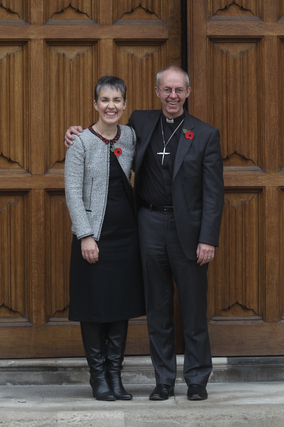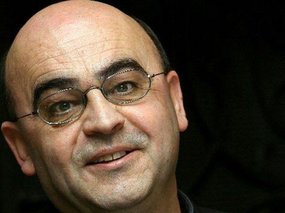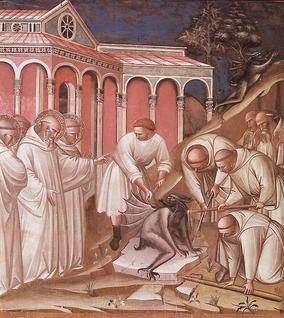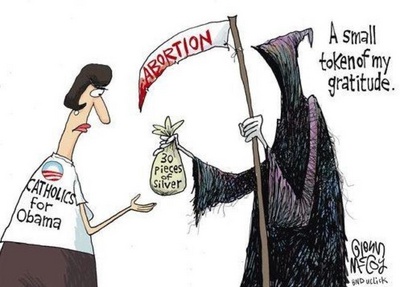 The 77 million Anglican Church has a new Archbishop of Canterbury with the appointment of Bishop Justin Welby, 57, as the 105th Ordinary of Canterbury, and successor of Saint Augustine. He was joined by his wife Caroline and his family, including he two-month old grand-daughter.
The 77 million Anglican Church has a new Archbishop of Canterbury with the appointment of Bishop Justin Welby, 57, as the 105th Ordinary of Canterbury, and successor of Saint Augustine. He was joined by his wife Caroline and his family, including he two-month old grand-daughter.
Significant remarks from the Evangelization Synod: a catechist’s view
 Tommaso Spinelli, 23, a catechist of young catechumens who works at the Catechetical Office of the Diocese of Rome, has some good things to say:
Tommaso Spinelli, 23, a catechist of young catechumens who works at the Catechetical Office of the Diocese of Rome, has some good things to say:
The new evangelization needs substance: it needs catechesis of a certain depth that is able to say something serious to our lives, but also and above all it needs lives of substance that demonstrate through actions the solidity of the Christian. It is even more important today, now that families are disunited and often abdicate their educative role, that priests demonstrate to the young their faithfulness to a vocation and the possibility of choosing an alternative way of living, better than that proposed by society.
My concern however is that these figures of substance are becoming a minority. The priest has lost trust in the importance of his ministry, he has lost charisma and culture. I see priests who adapt to the dominant thought. The same is true of the liturgy, which in the attempt to become original becomes meaningless. Priests, I ask you to find the courage to be yourselves. Do not fear because where you are truly priests, there you propose the truth of the faith without fear, we the young will follow. Indeed, the words of Peter are also ours: “Lord, to whom shall we go? You have the message of eternal life”. And we are infinitely hungry for something eternal and true.
I therefore propose:
1) an increase in the formation of priests, not only in spiritual but also cultural terms. Too often I see priests who have lost their role as masters of culture which had made them important for the whole of society. Today if we want to be credible and useful, we must return to having good cultural tools;
2) the rediscovery of the Catechism of the Catholic Church in its conciliar sense: in particular the first part of each session where the documents of the Council enlighten the traditional themes. The Catechism has, indeed, the wisdom of making the premise to the explanation of the Creed an inspired part of the Dei Verbum, in which the personalistic vision of revelation is explained, the Sacrosantum Concilium prior to the Sacraments, and the Lumen Gentium, which shows man created in God’s image, before the Commandments. The first part of each section of the catechism is fundamental to enable today’s man to feel faith as something that relates to him closely, and to be able to give an answer to his most profound questions;
3) Finally the liturgy: too often it is neglected and desacralized. It must be restored with dignity to the center of both the parochial and the territorial community.
Significant remarks from the Evangelization Synod: the Good News ensured by small groups of survivors
 The Cambodian Catholic experience is not something that rolls off our lips at cocktail parties or lunch dates in the USA. But the Asian perspective is needed: how does the Good News get rooted. Notice his points at the end of the post. The rather young bishop, The Most Reverend Olivier Michel Marie Schmitthaeusler, MEP, 42, vicar apostolic of Phnom Penh, Cambodia since 2010 told the Pope and the Synod:
The Cambodian Catholic experience is not something that rolls off our lips at cocktail parties or lunch dates in the USA. But the Asian perspective is needed: how does the Good News get rooted. Notice his points at the end of the post. The rather young bishop, The Most Reverend Olivier Michel Marie Schmitthaeusler, MEP, 42, vicar apostolic of Phnom Penh, Cambodia since 2010 told the Pope and the Synod:
The Khmer Rouge genocide killed bishops, priests, religious persons and the majority of Christians. For twenty years now, we are living a new time of the Acts of the Apostles with a first announcement of the Good News ensured by the small group of survivors, supported by the massive arrival of missionaries. Today we have about 200 adult baptisms each year… The small Church of Cambodia is in some ways a laboratory for evangelization in a Buddhist world, fully entered into a process of secularization driven by globalization a bit like the Asian dragons. The Ad Extra Mission is intimately tied to the Ad Intra Mission. Ad Extra and Ad Intra are mutually enriched by stimulating each other with the same and unique Mission of Evangelization!
Some meaningful points for a first proclamation of Jesus Christ and which may be extended also to a reflection about new evangelization. Two fundamentals: 1. The true encounter with Jesus Christ opens the heart to charity and to the experience of forgiveness to lead to the discovery of the gift of life. 2. The laity are apostles in this world (Apostolicam actuositatem).
How can the Church be the sacrament of Christ in the world for a new evangelization in actions and in truth? 1. A Church that touches the heart. 2. A simple Church. 3. A welcoming Church. 4. A Church in prayer. 5. A joyful Church.
Versed in Prayer: a poetry reading by Rita A. Simmonds
 To celebrate faith and culture in this Year of Faith, Rita A. Simmonds, a friend, is reading her poetry in a program Versed in Prayer, at St. Malachy’s-The Actors’ Chapel in NYC on 28 November 2012, 7pm.
To celebrate faith and culture in this Year of Faith, Rita A. Simmonds, a friend, is reading her poetry in a program Versed in Prayer, at St. Malachy’s-The Actors’ Chapel in NYC on 28 November 2012, 7pm.
Significant remarks from the Evangelization Synod: faith’s different reality in Northern Europe
 At the Synod of Bishops men and women from all parts of the world gathered in Rome in October to speak on matters pertaining to evangelization. We in the USA, need perspective: the lower Europe and North America is not the only place where the Christian faith is incarnated. The bishop of Tromso since 2009,
At the Synod of Bishops men and women from all parts of the world gathered in Rome in October to speak on matters pertaining to evangelization. We in the USA, need perspective: the lower Europe and North America is not the only place where the Christian faith is incarnated. The bishop of Tromso since 2009,
Norway, Berislav Grgić, 52, said to the Synod Fathers:
The Catholic Church in the Northern Lands – Denmark, Finland,
Iceland, Norway and Sweden – is a very small minority and therefore has neither
the advantages nor the disadvantages that the Catholic Church often comes
across in traditional and prevalently Catholic regions. Despite its limited
relevance, numeric as well as social, our Church is nonetheless a growing
Church. New churches are built or bought, new parishes are instituted,
non-Latin rites are added, there is a relatively high number of adult
conversions and baptisms, there are vocations to priesthood and to religious
life, the number of baptisms is much higher than the number of deaths and
number of those who abandon the Church, and attendance at Sunday Mass is
relatively high.
Is this cartoon unfair?
Julián Carrón says the Evangelization Synod was a “most decisive about the experience”
We need to keep a close eye on what happened at the Evangelization Synod just finished in Rome. A judgment, that is, an assessment of meaning, needs to be made so that we can derive a deeper call to conversion and New Life offered by Christ. Far from being a matter of strategy, the work done at the Synod by the bishops and experts and in time by the Pope, will prove, I think, to be historic.
Among the people appointed to the Synod was Father Julián Carrón, President of the Fraternity of Communion and Liberation. He addressed a letter to CL in which he said, in part:
Hearing the call to conversion that came from the synod hall, I could not help but remember the call that Fr. Giussani issued many years ago in Viterbo, inviting us to “recover the truth of our vocation and our commitment.” Because we, too, he told us, run the risk of “reducing our commitment too a kind of theorization of a socio-pedagogical method, reducing it to a kind of activism that follows upon this theorization, and then a commitment to the political defense of it. Instead, our task is to reaffirm and to propose to man, our brother, a fact of life.
The text of the letter: Father Julian Carron on Synod.pdf
Significant remarks from the Evangelization Synod: on interreligious dialogue
 In the time following the Synod of Bishops on the New Evangelization I think we need to review what was said. So often we move on so fast when an event is finished. A judgment, that is, an assessment, is required to understand with clarity and charity.
In the time following the Synod of Bishops on the New Evangelization I think we need to review what was said. So often we move on so fast when an event is finished. A judgment, that is, an assessment, is required to understand with clarity and charity.
Jean-Louis Cardinal Tauran, president of the Pontifical Council for Interreligious Dialogue, challenged a trend in the work of interreligious dialogue at the recent Synod of Bishops:
Christians often ignorant of the content of their own faith and incapable because of this of living of and for it, are not capable of interreligious dialogue that always begins with the assertion of one’s own convictions: there is no room for syncretism or relativism! Faced with adepts from other religions with a strong religious identity, it is necessary to present motivated and doctrinally equipped Christians. This makes the new evangelization a priority to form coherent Christians, capable of demonstrating their faith, with simple words and without fear.
As with the married couple, so with the Church: love and forgiveness given and received
Being really Catholic
opens one’s point of view to a great richness of the entire Church, East and West; being Catholic as John Paul II reminded us, is to breath with both lungs to invigorate the whole body. Most often Latin Catholics are too skeptical, too closed-minded to look beyond their parochial understanding of God and Church.
Each Sunday Jesuit Father Steve Bonian, a
Maronite Catholic American priest reflects on the liturgical theology of his
church. If you done a little reading in the liturgical history of the Church you will recall with joy that the Maronites have an incredibly rich liturgical tradition that ought to be appreciated more. For one thing the Maronite Liturgy is wonderfully Semitic in its pattern of prayer.
The Maronite Church, the majority of Catholics from Lebanon, celebrated
yesterday the Sunday of the Consecration of the Church. The Roman Church does
not have an equivalent liturgical observance, unless you make a connection with
the Christ the King Sunday, the final Sunday of the Roman Church’s year. The Maronite liturgical theology for the Sunday of the Consecration of the Church you note that “the Bride-Church re-consecrates herself and her children, the faithful, to Christ.”
Father Bonian writes,
The
letter to the Hebrews reminds us that the Temple in Jerusalem and it’s rituals
was only a temporal preparation for the “new order” that would be established
between Christ and his Church and her children.
From now on the Children of God
would worship him in Spirit and Truth on earth as in the Heavenly Jerusalem.
For it is not God’s will to dwell among stones, but in the caring hearts of his
faithful people, and among them to establish his Kingdom. Our Church Community
is this New Temple!
All Saints and All Souls Days in religious orders
 The Church is not liturgically monolithic: let’s consider the various observances of feasts of All Saints and the Commemoration of the Faithful Departed (All Souls) in various religious orders:
The Church is not liturgically monolithic: let’s consider the various observances of feasts of All Saints and the Commemoration of the Faithful Departed (All Souls) in various religious orders:
- November 5: the Society of Jesus
- November 7: the Order of Preachers
- November 13: the Order of St Benedict; Order of St Augustine; the Trinitarian Order
- November 29: the Franciscan Families
- October 5: the Capuchin Order
- November 5: the Franciscan Families
- November 8: the Order of Preachers
- November 13: the Carthusians
- November 14: the Order of St Benedict; the Trinitarian Order
- November 15: the Order of Carmel
- November 16: the Servite Order



